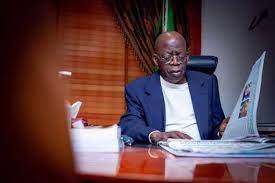The Socio-Economic Rights and Accountability Project (SERAP) has called upon President Bola Tinubu to leverage his influential role and leadership position to promptly overturn the unjustified ban imposed on 25 journalists and media houses from accessing the presidential villa. SERAP advocates for the swift restoration of accreditation for those impacted by this action.
SERAP has urged him to issue a public directive to officials at the presidential villa, allowing journalists and media outlets to carry out their duties freely and fulfill their constitutional responsibility of holding those in positions of power accountable.
The organization conveyed this appeal through a letter signed by its Deputy Director, Kolawole Oluwadare, and shared with Channels Television on Sunday.
In its communication, SERAP highlighted recent reports indicating that the Federal Government had revoked the accreditation of approximately 25 journalists who were covering activities at the Presidential Villa in Abuja.
The group emphasized that the affected journalists included individuals from prominent outlets such as Vanguard, Galaxy TV, Ben TV, MITV, ITV Abuja, PromptNews, ONTV, and Liberty.
In the letter dated August 26, 2023, the organization stated, “The exclusion of these journalists and media houses from covering the Presidential Villa aims to hinder their fulfillment of legitimate constitutional obligations.”
“It is essential to recognize that your administration cannot issue a sweeping prohibition on journalists attending public events. The public’s right to information and engagement would be compromised if journalists and media houses were barred from accessing the governmental hub.”
“Preserving media freedom stands as a foundational element of Nigeria’s democracy, enabling journalists to effectively scrutinize the government’s actions. This stands as a subject of paramount public concern. The government lacks the prerogative to selectively appoint journalists for reporting on its undertakings.”
The letter further states, “We kindly request that the recommended measures be implemented within 48 hours upon receipt or publication of this letter. If no response is received by that time, SERAP will be left with no choice but to initiate necessary legal proceedings in order to compel your government’s adherence to our request, all in the interest of the public.”
“The expulsion of journalists from the presidential villa might lead Nigerians to perceive your government as indifferent to the principles of media freedom, citizens’ access to information, and engagement in matters concerning their own governance.”
“Your government is legally bound to ensure and uphold media freedom and human rights, as well as to facilitate public entry to the presidential villa, which stands as a public trust. These obligations should take precedence over any purported ‘security concerns and overcrowding of the press gallery area.'”
“In a democratic and rule of law-based society, media freedom, unfettered access to information, and active citizens’ participation stand as essential prerequisites.”
The revocation of journalists’ accreditation tags constitutes a direct infringement on both media freedom and human rights, encompassing vital aspects such as access to information and the right to participation. Such a move could potentially cast a chilling effect on news collection and reporting tasks, possibly culminating in instances of self-censorship.
Scrapping the journalists’ accreditations would raise barriers between Nigerians and specific information pertaining to their government’s operations—a right enshrined in their constitution.
Media freedom, access to information, and the right to participate are indispensable for upholding transparency in government. These liberties hold such paramount importance within a democratic framework that they eclipse any nebulous claims of ‘security concerns and overcrowding of the press gallery area.’
Effectual exercise of media freedom, access to information, and citizens’ participation rights would safeguard and bolster an open and democratic society, aligning with your sworn commitment to uphold the Nigerian Constitution of 1999 [as amended].
Facilitating media coverage within the presidential villa could bolster the accuracy of information accessible to the general public, thereby promoting the public interest.
Reportedly, your administration justified this severe breach of the constitution by citing ‘an internal effort to curtail the excessive number of print photographers and overcrowding in the State House.’
Furthermore, your government cited purported ‘security apprehensions raised by State House officials and visiting dignitaries due to overcrowding in the press gallery area, impeding the pathway to the President’s Office.’
Based on available information, on August 18, 2023, your administration revoked the accreditation tags of around 25 journalists and media entities, depriving them of the capacity to cover events at the Presidential Villa in Abuja.
The list of journalists barred from entry encompasses representatives from Vanguard newspaper, Galaxy TV, Ben TV, MITV, ITV Abuja, PromptNews, ONTV, and Liberty. The withdrawal affects primarily reporters and camerapersons from print, broadcast, and online media outlets.
These journalists were simply instructed at the main gate of the presidential villa to surrender their accreditation tags.
The Society for Economic Rights and Accountability Project (SERAP) expresses concern that the annulment of accreditations for 25 journalists overseeing the presidential villa constitutes a substantial transgression of the Nigerian Constitution and the nation’s international human rights commitments.
Our requests are founded in the public’s welfare and align with the prerequisites of the Nigerian Constitution of 1999 [as amended], as well as the nation’s international obligations, including those detailed within the International Covenant on Civil and Political Rights and the African Charter on Human and Peoples’ Rights, to which Nigeria is a signatory.
As stipulated in section 22 of the Nigerian Constitution, the mass media—encompassing ‘the press, radio, television, and other mass media agencies—must always be at liberty to uphold the essential objectives outlined in this Chapter, while also holding the government accountable to its populace.’
In line with section 14(2)(c) of the Constitution, it is obligatory to ensure that ‘the participation of the people in their government is guaranteed in accordance with the provisions of this Constitution.’
Equally significant, Article 9 of the African Charter on Human and Peoples’ Rights upholds the rights of ‘every individual to access information and express and share their opinions.’
Article 13 of the Charter underscores the rights of citizens to actively partake in their government and equally access public services and property.
Comparable provisions can be found in Articles 19 and 25 of the International Covenant on Civil and Political Rights.
SERAP also urges you to take substantial and effective actions to guarantee the reverence of media freedom, access to information, and citizens’ entitlement to participate in their government.




